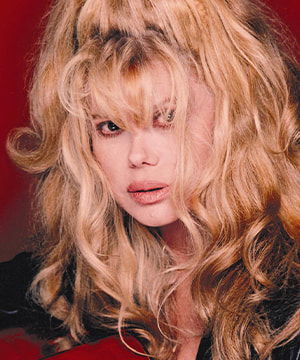Charo
Only a few people in show business are recognized with just one name. Only a few bring a smile to everyone's face when that name is mentioned. Only a few truly deserve to be called "multi-talented." Charo is one of those few.
Yet when the internationally-known singer, dancer, comedienne, actress, and award-winning classical guitarist won the Female Pop Album of the Year Award at the 1995 Billboard International Latin Music Conference for her flamenco-inspired album Guitar Passion, it was a needed reminder that, as Latin music explodes in popularity, one of its most visible exponents has been Charo. When no one else was presenting the fire and passion of Latin music in the nightclubs of Las Vegas, Atlantic City, and other showrooms, Charo was. When no one else was singing both Spanish and English, called Spanglish, Charo was. When no one else was playing classical guitar on TV talk shows, Charo was. She's the mamacita of the Macarena, the queen of salsa disco, and the matriarch of "cuchi-cuchi." Today, Charo is more popular than ever. A new album of dance music, Gusto, and a home video, Blame It On The Macarena!, are currently in release. When not performing her sold-out, five-times-a-week, 36-weeks-a-year stage show at the 500-seat Outrigger Reef Tower's Polynesian Palace in Honolulu, Hawaii -- where she's become the top entertainment attraction on the Islands -- she tours around the world, from Europe to Latin America to Asia. She also continues to appear in Las Vegas, Atlantic City, Reno and around the United States. Charo relocated to Hawaii in 1988 after her son Shel turned six years old. "I wanted our son to grow up in a healthy and beautiful environment. I just closed my eyes to some good offers in show business. I love show business, but family is my priority." Maria Rosario Pilar Martinez Molina Baeza was born in Murcia in southeastern Spain and nicknamed Charo as a child. Her father was a lawyer who was exiled to Casablanca during the Franco dictatorship, returning only when Franco died. Her mother was a homemaker; "She came from a time when girls just had children and cooked," Charo adds proudly, "but she educated herself." Attending school at the Catholic convent of the Sacred Heart, Charo began playing guitar at age nine. One of her teachers was Andres Segovia, father of modern classical guitar music. "We were a bunch of kids, and he gave us general lessons. He was very nice, and never accepted money. You would watch this incredible man with such big fingers play, telling you what to do. It was beautiful to me." As a teenager in Madrid, she recorded albums, debuted on film starring in the Spanish classic "Don Juan Teniorio," and was featured in a TV show similar to Sesame Street. When famed Big Band leader Xavier Cugat saw her in the latter, he decided she was what his orchestra needed. She joined his band, but after a while she went out on her own to become a solo performer. At 19, she began appearing as a solo artist. Among her recording hits were La Salsa and Flamenco Salsa on Capital. Her first US album was Cuchi-Cuchi from Charo & The Salsoul Orchestra, on Salsoul Records (a one-time leader in Latin disco), and went Platinum. The single Dance A Little Bit Closer became a #1 hit in clubs worldwide. The album also included Cuchi-Cuchi and Borriquito. Her follow-up was OlŽ, OlŽ (Salsoul), spawning hits with its title track and Stay With Me which achieved Gold status. She was presented with the prestigious Golden Eagle Award as Outstanding Entertainer of the Year by Nosotros, the leading Hispanic arts organization. Other musical winners have since included Gloria Estefan, Carlos Santana and Los Lobos. Charo also received the Distinguished Career Award from Hispanic Exhibitor and Distributor. Meanwhile on TV, she played Aunt Charo on the sitcom Chico and the Man, and appeared in The Concorde - Airport '79. No guest star was featured on more episodes of the series The Love Boat than Charo. She also costarred in Moon Over Parador (1988) and given voice to a character in the animated Hans Christian Andersen's Thumbelina (1994) with Carol Channing, Gilbert Gottfried and John Hurt. Thanks to hundreds of appearances on top-rated TV series from Laugh-In to The Carol Burnett Show, commercials (Sun Country Wine Cooler, Miller Lite Beer, Pepsi, Macco, to name a few) and talk shows such as The Tonight Show, The Merv Griffin Show, David Letterman, etc., Charo became a household name, instantly recognizable for her big blonde hair, tight flamboyant clothes, voluptuous figure, fractured English, enough energy to light up every marquee in Las Vegas, and the hip-shake she calls the "cuchi-cuchi." Charo muses, "I tell you, I still don't know what the hell 'cuchi-cuchi' means. But hey, it works for me!" In 1978, she took a Hawaiian honeymoon with Kjell Rasten, a Swedish-born businessman, and fell in love with the Islands. Some years later, they completed building a home on Kauai on the spot where "Bali Hai" was sung in the movie South Pacific and opened a restaurant, aptly named Charo's, nearby in 1985. With the international tourism attracted to Hawaii, nightclubs there require a star with broad appeal -- and Charo certainly qualifies. She's fluent in French, English, Italian, and Japanese, as well as her native Spanish. One of the highlights in her shows is when she plays classical guitar. She was the winner of Guitar Player magazine's Readers Poll as Best Flamenco Guitarist two years in a row. She usually plays guitar two hours a day, but before major concerts will practice up to five hours daily. "Sometimes I think, taking the hours I give to the guitar, when I die, half of my life will have been given to that instrument." When audiences began asking when she'll do an album spotlighting her playing, she began preparing Guitar Passion. Called "a fine flamenco-rooted album that spotlights her fluid fingerplay" (Billboard, June 10, 1995), Guitar Passion (Universal Wave Records) was named Pop Album of the Year (female artist) at the 1995 Billboard International Latin Music Conference, and reached Platinum worldwide. Charo recalls, "Guitar Passion introduced me as a musician to those who did not know I could play guitar. But while promoting it, people would ask 'What happened to 'cuchi-cuchi' and that energy and that wiggle?'." Gusto (Universal Wave Records) released February 1997, is Charo's first dance album since her disco hits. It includes a new Dance A Little Bit Closer, Give Me Cuchi, and her own take on Besame Mucho. Two years ago, while performing in Madrid, she heard the original Macarena and brought it back with her to America to include in her live performances. She also developed her version of an accompanying dance: "When I do it, it's more like a dancer, more seductive, not like a robot." Charo has now become the woman most associated with the Macarena. Her home video, Blame It On The Macarena! (Madacy Entertainment Group), features Charo performing both the song and the dance in her uniquely entertaining style -- fun, passionate and funny. Not long ago, a woman scheduled for open heart surgery was gripped by despair. She turned on the TV and there was Charo, whose bubbly personality and zany antics made her laugh. When she awoke after the successful operation, glad to be alive, she sent a letter addressed simply to "Charo's, Hawaii." Recalls Charo, "She thanked me because in those terrible moments for her, I entertained her. There is nothing better than that. What I do is from the heart. This is what I was born for." Only a few people in show business attract audiences ranging from young children to senior citizens, and from all ethnic cultures. Today, only a few combine comedy with music. Surely, only a few have as much fun as she. Charo is one of those chosen few. Only CHARO. |
The Stander Group, INC. | 4533 Van Nuys Blvd. #401 | Sherman Oaks, CA 91403
TEL 818-905-7000 | FAX 818-905-6813 | EMAIL: [email protected]
Copyright © 2022
TEL 818-905-7000 | FAX 818-905-6813 | EMAIL: [email protected]
Copyright © 2022




